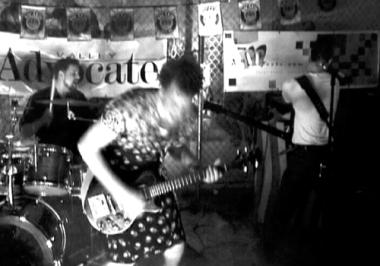"Although it would never fly here in the States, we were professors for a short while [in Guatemala]," said Andrew Huckins of himself and his brother, Galen, in a recent interview with the Advocate. While living in the Central American country, the Huckins brothers walked into Jesus Castillo Conservatory, and proposed to teach a new jazz program for the university's students. (The brothers have no formal training—Andrew is a freshman at Hampshire College in Amherst.) School officials accepted the brothers' proposal, and they fashioned themselves as professors of jazz.
"We just walked in and proposed the program, then designed and taught it," said Huckins. "People who have a vision and are following it, it's almost a moot point if it's good or not."
Though Andrew is now based in Western Mass. and Galen in Oregon, the brothers have applied the same formula—selling themselves and their ideas with confidence and excitement—that worked in Guatemala to their new project, Filmusik, which aims to marry live music and film in a contemporary style.
Filmusik's first project is The Superman Orchestra, which features four live performances (each venue is hosting two) simultaneously in Northampton and Portland, Oregon. The shows comprise six of the 17 original Max Fleischer Superman shorts circa 1941-42—Arctic Giant, Volcano, Billion Dollar Limited, Mechanical Monsters, Bulleteers and The Mad Scientist—accompanied by a live orchestra performing an original score created specifically for Filmusik, contemporary sound effects recorded by the Huckins brothers, and live dialogue performed by actors. Northampton's performance features WHMP and The River radio personalities Jaz Tupelo, Monte Belmonte and Bill Dwight.
The brothers chose the Superman shorts as the basis for their first Filmusik project for a variety of reasons.
"Everybody loves Superman—they're incredibly high quality, acclaimed Fleischer classics with gorgeously rendered imagery," said Huckins. "They're short, and they share the same general theme—Lois in need; Superman saves her—and intro and outro. Plus they appeal to everyone from seniors to children, families to stoned college kids and mid-life crisis [sufferers], to music snobs and film buffs."
The choice is also germane to Filmusik's mission of using music and film to stimulate collaboration between artists working in a variety of media. In order to accomplish this, Huckins believes, it's important for films to be accessible. The 66-year-old Superman shorts are available for free use because they are now in the public domain.
"I think for the last few decades, some of these things have been held under lock and key," said Huckins. "Even at places like Pleasant Street [Theater] there's still this funny limitation of outside sources and issues of corporate rights. We have these opportunities for collaboration, for people to show their work and to get paid."
Although Filmusik is making most of its work, including the scores, available for widespread reuse, Huckins would indeed be upset if someone else's use of his work interfered with his reusing it as he desired—for example, having showings in Boston and New York.
"I would mind if [someone else's use] impinged upon what I wanted to do with it," said Huckins.
It's equally important for Huckins to adequately compensate everyone involved in the project, including himself and his brother. This project is funded by the Huckins' relying almost completely on ticket sales to pay for theater rental, voice actors' fees, ticketing service and composers' fees. While these arrangements—not paying the fees until all aspects of the contracts are completed—are quite normal, according to Huckins, they're still quite nerve-wracking.
"We're not trust-fund babies," said Huckins. "I have a few hundred in my bank account& This is the first time in my life I've put that much personal finance on the line. But I really think that when you believe in something you can just make it happen. I don't mean to sound too na?ve& [a disaster] could still happen, like a sleet and rainstorm, and no one wants to go out that night. Then we could be in some trouble here."
The Filmusik orchestra includes the basic instrumentation—flute, clarinet, trumpet, trombone, percussion, piano, violin, viola, contrabass and cello—of orchestras of the silent movie era, and is conducted by UMass-Amherst's director of orchestral activities Lanfranco Marcelletti. The Brazilian native got involved with the Filmusik project when Huckins found him on the university's website, called him out of the blue and, according to Huckins, sold the internationally renowned conductor on the viability of the project.
"How do you propose a project that's not a project yet?" said Huckins. "Smoke and mirrors. I talked as confidently as I could& It's surprising at first, but when you're enthusiastic and confident, people recognize that and it excites them."
The Huckinses found the five participating composers (Galen Huckins is the sixth)—Donald Sosin, Jesse Hopkins, Scott Ordway, Makia Matsumura and Samuel Richards—using the same grassroots approach. They started out by perusing Craig's List. After that didn't yield many results, the Huckinses networked through contacts until settling on the current roster of composers. The six have been constantly revamping the scores as rehearsals progress.
"Some stuff has changed so drastically from how we envisioned it at the time& We've had to keep these composers on task," said Huckins. "I hope that [the screenings] will be incredibly pleasing for a wide variety of people. I don't know if this will come through to the majority of the people but being able to realize things that you dream about doing and having the support and structure to do those things—I'm trying to steer people towards goals of future projects like this. I hope people can get that underlying inspiration."
The Superman Orchestra takes place Nov. 7 and 14, 7:30 p.m., $10/seniors and students, $15/general, Academy of Music Theatre, 274 Main St., (413) 586-8686, www.thesupermanorchestra.com.



